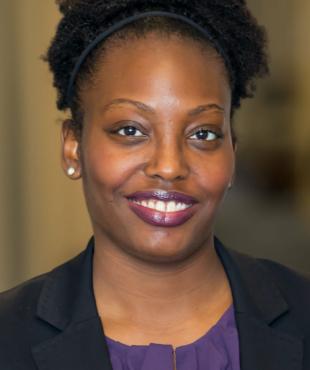
Monica Meriweather
Monica Meriweather was sure she was going to become a lawyer—until she was not.
“I knew—I just knew—that I was going to law school,” she says. “I majored in African American studies in undergrad [at Northwestern University], and I probably should have majored in theater. It didn’t matter what I studied, I just needed some core competencies and an undergrad degree.”
Meriweather, one of two full-time students in the Master of Arts Program in Social Sector Leadership and Nonprofit Management at the Crown Family School of Social Work, Policy, and Practice, worked as a conflicts assistant at a law firm after graduating with her BA. But when it came time to apply to law school, the economy had tanked, and what had once seemed like a safe bet was now a risky proposition.
“The economy was absolutely insane, and the idea of paying six figures in loans knowing that I wanted to do more public interest, public-facing work—and that I probably wasn't going to recoup that expense for quite some time—didn’t seem like the best route,” Meriweather says.
Making an Impact
As she mulled over potential career paths, the nine-to-five nature of her law assistant job gave Meriweather time to volunteer with Chicago Cares, a nonprofit that partners with a number of community-driven organizations on Chicago’s South and West Sides. Through Chicago Cares, she became aware of and eventually spent years volunteering with SOS Children's Villages, an organization on the South Side dedicated to family reunification.
“It’s an important part of my story,” Meriweather says of her volunteer work. “It made me ask, ‘How can I get paid to do things that are impactful and meaningful to me?’”
Still uncertain of her future path, she applied for Teach for America and worked as a middle school teacher in Dallas for two years, a job that led to a stint as a talent manager for a network of charter schools in the Dallas-Fort Worth area.
“That job made me realize the need for and importance of teachers,” she says. “They need people who really care about kids and want to make sure they succeed.” And so Meriweather returned to Chicago and worked in education for four more years, first as a ninth-grade civics teacher, then as a college counselor and seminar instructor. It was then she had another revelation.
“I worked in Englewood, which is a couple miles from where I grew up,” she explains. “Being able to come back to Chicago and work with students that look like me, students who were having similar experiences [to those] I had when I was younger was important to me and for figuring out what was next.”
The Path to Crown
These experiences helped Meriweather figure out a few things about the career she wanted: it would involve nonprofits, community-building, and education—just not in the classroom.
“I was looking for something that married my office skills with education,” she says. And when a friend enrolled in the Crown Family School program for clinical social work, she discovered that the school also offered an administrative track.
“I've been working in the [education] industry for a while, and I think it's difficult to transition out of the classroom into corporate nonprofit management-level work,” she says. “When I saw [the Crown Family School] program, I thought it was perfect. I especially appreciated the Crown Family School’s social justice lens because I had taught my students that way. We learned civics through a social justice lens, understanding how the world impacts Black and brown students. And as a Black woman, [social justice] is important to me because I'm teaching both Black and brown students and experiencing these things when I go out into the world.”
In addition to the Crown Family School’s mission, Meriweather also appreciated her classmates. “My favorite part of the program is learning from my cohort,” she says. “Individuals from different walks of life, different organizations, different thoughts bring their unique ideas. I find their perspectives are invaluable.”
Although she is not quite sure exactly where she will land after graduation, Meriweather feels well-prepared for her future career in education-focused nonprofit work. “It's a good balance of theory and practical management skills,” she says. “Last quarter, I took a class called ‘Key Issues in Social Sector Leadership’ and it changed the way I perceive how a lot of organizations work. If you're looking for tangible skills, but also to understand the history and ideas behind social service organizations, this is a great place to start.”